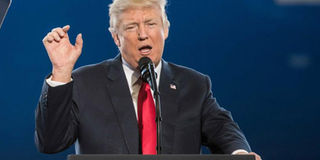How Trumpocracy corrupts democracy

President Donald Trump addresses a crowd during the debut event for the Dreamliner 787-10 at Boeing's South Carolina facilities on February 17, 2017 in North Charleston, South Carolina. Trump has launched aggressive attacks on institutions meant to hold him accountable. PHOTO | AFP
What you need to know:
- Trump’s willingness to abide by the US Constitution and Supreme Court decisions is far from certain.
- He did not inherit a perfect system. But, he is exacerbating its weaknesses — and creating new ones.
American democracy is a complex, self-organising system.
In terms of network science, President Donald Trump is a “superhub”: the most well-connected human “node”, located in the centre of the network.
While he does not have control over the entire system — he himself is subject to its systemic forces — he has enough influence that he could cause it to fail.
Complex systems don’t fail easily. They are generally adaptive and self-correcting.
When they become too skewed, circuit breakers kick in to restore balance.
But if circuit breakers are disabled, the system will ultimately self-destruct.
The likelihood of such an outcome is hard to predict.
But in situations of absolute uncertainty, it is advisable to assume the worst, and many indicators seem to point to a potential “hostile takeover” of liberal democracy by Trump and his cohorts.
The most effective way to destroy a complex system is, first, to manufacture chaos.
The administration has already employed shock tactics to paralyse and distract voters, while antagonising allies, provoking enemies, and creating new alliances with dubious partners.
He has gone so far as to create a parallel universe using “alternative facts”.
Trump has not taken these steps, as some claim, entirely out of ignorance or irrationality.
PERILOUS JOURNEY
In a 2014 speech, Steve Bannon, his chief strategist, cited the Fascist Italian philosopher Julius Evola, who argued that “changing the system is not a question of contesting and polemicising, but of blowing everything up”.
It is also a question of applying “divide-and-conquer” tactics.
The “divide” part has been under way since he launched his campaign, which was based on divisive rhetoric.
Now comes “conquer”, through the dismantling of democracy’s institutional underpinnings.
Trump has launched aggressive attacks on institutions meant to hold him accountable.
They include the judiciary and media, as well as the international bodies that underpin our geopolitical and economic order, including the UN, Nato, and the EU.
So far, democratic institutions, particularly the Press and the judiciary, have proven resilient.
But Trump’s willingness to abide by the US Constitution and Supreme Court decisions is far from certain.
And his fascination with autocrats such as Vladimir Putin has translated into an eagerness to adopt their tactics and symbols of power, evident in his (unfulfilled) request for tanks and missile-launchers at his inauguration.
Trump has casually suggested that the US should commit war crimes, such as pillaging countries’ oil resources and torturing prisoners and also default on national debt as a way to reduce it — a strategy he has employed with his firms.
Of course, he did not inherit a perfect system. But, he is exacerbating its weaknesses — and creating new ones.
TAKE ACTION
Trade protectionism won’t help, because trade is not a zero-sum game, and most US manufacturing jobs have been lost to automation, not trade.
Worse, given the implications of trade for geopolitical and financial-system dynamics, the net consequences of protectionism will likely be negative.
Given his penchant for oversimplification, Trump not only fails to deal effectively with the problems at hand; his short-sighted policies will likely trigger unintended consequences, and possibly even the so-called butterfly effect, whereby remote minor events can trigger the failure of complex systems.
What is certain however is that the longer we allow Trump to distort our system, the more difficult it will be to limit or repair the damage.
All Americans are part of the system and, with their individual actions, they have the power to contribute to large-scale effects in defence of their liberal democracy.
Ms Navidi is CEO of BeyondGlobal, a consulting firm advising on macroeconomic and strategic positioning, and the author of $uperHubs: How the Financial Elite and their Networks Rule Our World.
Copyright: Project Syndicate, 2017. www.project-syndicate.org




